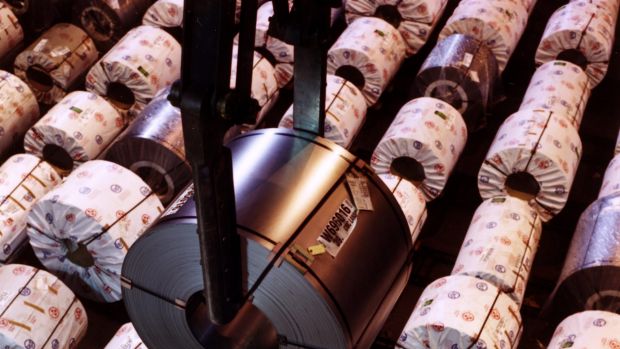It's a slam dunk, right? Blocking imports into the US will be good for the US economy, adding jobs and helping to make the US great again, at least according to the mantra of the newly installed US President Donald Trump.
Well, as far as the steel industry goes, that may not be the case, particularly with Trump's decision to pull out of the Trans Pacific Partnership.
Trump: Border tax on external manufacturing
Opening his first official week in office, President Donald Trump warned business leaders Monday that he would impose a "substantial border tax" on companies that move their manufacturing out of the United States.
And even if it does manage to wean the US off steel imports, one fall out will be further pressure on costs within the US.
"Surprisingly despite the headlines, the reversal of [the Trans Pacific Partnership] policy is not an entirely positive outcome for the US steel industry," commodity analysts at Wood Mackenzie noted in a report. "In 2015, around 30 per cent, or 11 million tonnes, of all steel imported into the US came from the countries in the agreement at a value of approximately $US11 billion ($14.5 billion).
"At the same time, 89 per cent or around 9 million tonnes of all steel exported from the US was destined to these countries – at a value of approximately $US12 billion ($15.8 billion) .... The US steel industry made more money by selling steel to these trading partners than it lost by importing from them."
Not only that, but the value of steel exported averaged around $US1,400 per tonne ($1,850) compared to $US972 ($1280) for an imported tonne, signalling the US exported higher value product.
As the report noted, this is "the sort of steel that helps to keep the high-cost US steelmaking business afloat – not necessarily a bad thing!"
Look more closely at the numbers, and overturning the TPP agreement has little immediate impact on steel since most of the steel sourced from TPP member countries actually came from Canada and Mexico which are members of the North America Free Trade Agreement.

Between them they made up 72 per cent of the 'TPP-sourced imports' and 99 per cent of 'TPP-destined exports', Wood Mackenzie noted.
"Thus, for the US steel industry, the latest executive order to withdraw from the TPP makes little difference." it said. "Ultimately, NAFTA plays a more important role for the sector."
The new US president also wants to renegotiate NAFTA which could affect steel imports from Canada and Mexico.
"US steel and manufacturing industries are heavily reliant on imports – as much as 60 per cent of total steel consumed in the US (including that imported in the form of manufactured goods) comes from imports," the report noted.
"Theoretically, the US has the resources to source this steel domestically, but not instantly and at what would likely be a higher cost. Thus weaning itself off 'imported steel' will put pressure on manufacturers' costs and ultimately the US consumer will suffer."
For Australia, the impact on the US steel industry has both pluses and minuses. While it could impact any exports by Bluescope Steel into the US market, Bluescope is also a large steel producer within the US, via its fully owned Northern Star unit, producing around 2 million tonnes a year.
A little over a year ago, Bluescope paid $US720 million to acquire the half interest in this company it didn't already own.

